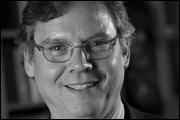Meadville Lombard to sell Chicago campus
Unitarian Universalist seminary to discuss possible partnership with Boston-area Andover Newton Theological Seminary.
What that partnership ultimately will look like—indeed, whether it will happen at all—remain open questions. The presidents of both schools are planning a one-on-one meeting in December, and they expect to release a joint statement after those talks are complete.
In early November, the Meadville Lombard Board of Trustees authorized the talks with Andover Newton. At the same time, the trustees also voted to authorize the sale of the school’s Chicago campus near the University of Chicago. It includes a main educational building, which houses the 140,000-volume Wiggin Library, and three large, converted houses.
Among the trustees’ goals in selling the campus are to provide the school with financial flexibility in approaching a possible partnership with another seminary; to fund Meadville Lombard’s new educational model; and to get out from under the demands of deferred maintenance on the property. The Rev. Dr. Lee Barker, Meadville Lombard’s president, said that there are already parties interested in purchasing the buildings.
It’s possible that a sale could include a lease-back provision for Meadville Lombard. Ideally, Barker said, the school will remain in Chicago. But that is also open to discussion.
Andover Newton has already been engaged in talks with the leadership of Colgate Rochester Crozer Divinity School, in Rochester, N.Y., and other seminaries about possible partnerships. On May 26, the Andover Newton Board of Trustees approved engaging in discussions with the Rochester school.
The economic downturn, along with the already-spiraling costs of higher education, are leading seminaries across the country to look at ways to partner and share the expenses of running their institutions. “Mergers and partnerships are being considered by a lot of schools,” said the Rev. Dr. Daniel O. Aleshire, executive director of the Association of Theological Schools (ATS). “This recession has been hard on seminaries because, on average, more of their operating budgets are supplied by their endowments compared to the rest of higher education. When the market went down so quickly, it raised serious question for many ATS schools.”
The endowment at Meadville Lombard has shrunk by about one-third, falling to $12 million from a peak of approximately $18 million. But Barker said that the school has been examining ways to achieve financial sustainability since he became president in 2003. “Like so many theological schools, undercapitalization has been an ongoing problem for Meadville Lombard for decades,” Barker said.
Meadville Lombard had retained consultants from the Auburn Theological Seminary's Center for the Study of Theological Education, based in New York City, to examine its options for the future. Anthony T. Ruger, senior research fellow at Auburn, consulted with Meadville Lombard. He said that compared to other seminaries, “Meadville Lombard is right in the stream of things.”
Small seminaries are exploring cutting their budgets, selling property, and forming alliances with other institutions, Ruger said. It’s not at all uncommon for seminaries to be exploring alliances outside of their own denominations, he said.
Aleshire agreed. “Partnerships may be across denominational lines, but they tend not to be across broad theological communities,” he said. “A Unitarian Universalist school might talk with a progressive Protestant school like Andover Newton, but it probably wouldn’t talk with a very conservative Protestant school.”
Meadville Lombard had approached three different schools about a potential partnership. One school asked that its name be held in confidence. One was Andover Newton. And the third was Starr King School for the Ministry in Berkeley, Calif., the only other Unitarian Universalist seminary.
Barker explained that for any partnership to move forward, the arrangement would have to ensure three things. Meadville Lombard must be able to preserve its UU identity and focus on Unitarian Universalist ministerial formation. Meadville Lombard must be able to pursue its new educational model, which focuses on community-based pedagogy. And any partnership must be financially viable.
Over the past six years, about 15 percent of Andover Newton graduates have been Unitarian Universalist. That’s according to Nancy Nienhuis, dean of students and community life at Andover Newton, which has between 75 and 80 graduates each year.
The Rev. Nick Carter, president of Andover Newton, said in a statement: “We are at a very beginning stage of this exploration with Meadville Lombard, having at this point only agreed to meet and talk. Each institution has its own valued theological identity, legacy, and institutional momentum, which could present challenges for us. However, the economic and social times in which we find ourselves present opportunities for surprising new approaches to how we might prepare a new generation of leaders for the church and society.”
Carter also noted that Andover Newton is engaged in discussions with several schools regarding the development of a new model for theological education.
For Meadville Lombard, if talks with Andover Newton are fruitful, it could lead to talks that later include Colgate Rochester and other schools. Barker said, “An eventual agreement with Andover Newton and possibly other schools could produce a university of theological schools, similar to the ancient universities of Europe.”
“As we’ve been looking for innovative ways to develop education programs, Andover Newton has also been looking at innovative ways,” Barker said. “That’s one of the reasons we think a partnership holds great possibility for the future. There is a spirit of innovation at these two schools.”
Though the talks are very preliminary, Meadville Lombard has been clear on one issue: timing. On its website, it answers a series of Frequently Asked Questions [PDF] about potential partnerships. “We need a decision in 2010,” it states. “The ‘do nothing’ option is not sustainable for Meadville Lombard.”
This article has been amended since its initial publication. See sidebar for links to related resources.








